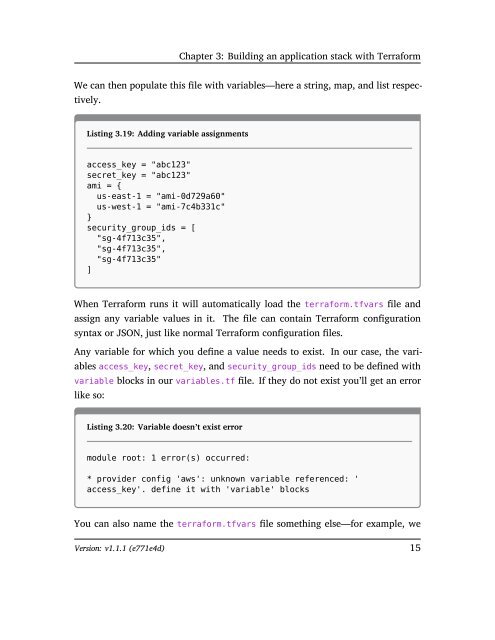The Terraform Book
TheTerraformBook_sample
TheTerraformBook_sample
You also want an ePaper? Increase the reach of your titles
YUMPU automatically turns print PDFs into web optimized ePapers that Google loves.
Chapter 3: Building an application stack with <strong>Terraform</strong><br />
We can then populate this file with variables—here a string, map, and list respectively.<br />
Listing 3.19: Adding variable assignments<br />
access_key = "abc123"<br />
secret_key = "abc123"<br />
ami = {<br />
us-east-1 = "ami-0d729a60"<br />
us-west-1 = "ami-7c4b331c"<br />
}<br />
security_group_ids = [<br />
"sg-4f713c35",<br />
"sg-4f713c35",<br />
"sg-4f713c35"<br />
]<br />
When <strong>Terraform</strong> runs it will automatically load the terraform.tfvars file and<br />
assign any variable values in it. <strong>The</strong> file can contain <strong>Terraform</strong> configuration<br />
syntax or JSON, just like normal <strong>Terraform</strong> configuration files.<br />
Any variable for which you define a value needs to exist. In our case, the variables<br />
access_key, secret_key, and security_group_ids need to be defined with<br />
variable blocks in our variables.tf file. If they do not exist you’ll get an error<br />
like so:<br />
Listing 3.20: Variable doesn’t exist error<br />
module root: 1 error(s) occurred:<br />
* provider config 'aws': unknown variable referenced: '<br />
access_key'. define it with 'variable' blocks<br />
You can also name the terraform.tfvars file something else—for example, we<br />
Version: v1.1.1 (e771e4d) 15


